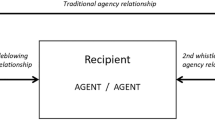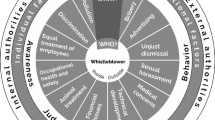Abstract
This paper provides an exploration of whistleblowing as a protracted process, using secondary data from 868 cases from a whistleblower advice line in the UK. Previous research on whistleblowing has mainly studied this phenomenon as a one-off decision by someone perceiving wrongdoing within an organisation to raise a concern or to remain silent. Earlier suggestions that whistleblowing is a process and that people find themselves inadvertently turned into whistleblowers by management responses, have not been followed up by a systematic study tracking the path of how a concern is repeatedly raised by whistleblowers. This paper provides a quantitative exploration of whistleblowing as a protracted process, rather than a one-off decision. Our research finds that the whistleblowing process generally entails two or even three internal attempts to raise a concern before an external attempt is made, if it is made at all. We also find that it is necessary to distinguish further between different internal (e.g. line manager, higher management, specialist channels) as well as external whistleblowing recipients (e.g. regulators, professional bodies, journalists). Our findings suggest that whistleblowing is a protracted process and that this process is internally more protracted than previously documented. The overall pattern is that whistleblowers tend to search for a more independent recipient at each successive attempt to raise their concern. Formal whistleblower power seems to determine which of the available recipients are perceived as viable and also what the initial responses are in terms of retaliation and effectiveness.


Similar content being viewed by others
References
Andrade, J. A. (2015). Reconceptualising whistleblowing in a complex world. Journal of Business Ethics, 128(2), 321–335.
Apaza, C. R., & Chang, Y. (2011). What makes whistleblowing effective: Whistleblowing in Peru and South Korea. Public Integrity, 13(2), 113–130.
Blenkinsopp, J., & Edwards, M. S. (2008). On not blowing the whistle: Quiescent silence as an emotion episode. Emotions, Ethics and Decision-Making Research on Emotion in Organizations, 4, 181–206.
Brown, A. J., Lewis, D., Moberly, R., & Vandekerckhove, W. (Eds.). (2014). International handbook on whistleblowing research. Cheltenham: Edward Elgar Publishing.
Donkin, M., Smith, R., & Brown, A. J. (2008). How do officials report? Internal and external whistleblowing. In A. J. Brown (Ed.), Whistleblowing in the Australian public sector. Enhancing the theory and practice of internal witness management in public sector organisations (pp. 83–108). Canberra: ANU Press.
Dozier, J. B., & Miceli, M. P. (1985). Potential predictors of whistle-blowing: A prosocial behavior perspective. Academy of Management Review, 10(4), 823–836.
Dworkin, T., & Baucus, M. S. (1998). Internal vs. external whistleblowers: A comparison of whistleblowering processes. Journal of Business Ethics, 17(12), 1281–1298.
Gundlach, M. J., Douglas, S. C., & Martinko, M. J. (2003). The decision to blow the whistle: A social information processing framework. Academy of Management Review, 28(1), 107–123.
Jones, J. C., Spraakman, G., & Sanchez-Rodriguez, C. (2014). What’s in it for me? An examination of accounting students’ likelihood to report faculty misconduct. Journal of Business Ethics, 123(4), 645–667.
Kaptein, M. (2011). From inaction to external whistleblowing: The influence of the ethical culture of organizations on employee responses to observed wrongdoing. Journal of Business Ethics, 98(3), 513–530.
Lewis, D., & Vandekerckhove, W. (2015). Does following a whistleblowing procedure make a difference? The evidence from the research conducted for the Francis Inquiry. In D. Lewis & W. Vandekerckhove (Eds.), Developments in whistleblowing research (pp. 85–105). London: International Whistleblowing Research Network.
Lewis, D., & Vandekerckhove, W. (2016). Trade unions and the whistleblowing process in the UK: An opportunity for strategic expansion? Journal of Business Ethics. https://doi.org/10.1007/s10551-016-3015-z.
MacGregor, J., & Stuebs, M. (2014). The silent Samaritan syndrome: Why the whistle remains unblown. Journal of Business Ethics, 120(2), 149–164.
Mansbach, A., & Bachner, Y. G. (2010). Internal or external whistleblowing: Nurses’ willingness to report wrongdoing. Nursing Ethics, 17(4), 483–490.
Mesmer-Magnus, J., & Viswesvaran, C. (2005). Whistleblowing in organizations: An examination of correlates of whistleblowing intentions, actions, and retaliation. Journal of Business Ethics, 62, 277–297.
Miceli, M. P., & Near, J. P. (1989). The incidence of wrongdoing, whistle-blowing, and retaliation: Results of a naturally occurring field experiment. Employee Responsibilities and Rights Journal, 2(2), 91–108.
Miceli, M. P., & Near, J. P. (1992). Blowing the whistle. New York: Lexington Books.
Miceli, M. P., & Near, J. P. (2002). What makes whistle-blowers effective? Three field studies. Human Relations, 55, 455–479.
Miceli, M. P., Near, J. P., & Dworkin, T. M. (2008). Whistleblowing in organizations. New York: Routledge.
Nader, R., Petkas, P. J., & Blackwell, K. (Eds.). (1972). Whistle blowing: The report of the conference on professional responsibility. New York: Grossman.
Near, J. P., & Miceli, M. P. (1985). Organizational dissidence: The case of whistle-blowing. Journal of Business Ethics, 4, 1–16.
Near, J. P., & Miceli, M. P. (1986). Retaliation against whistle blowers: Predictors and effects. Journal of Applied Psychology, 71(1), 137.
Near, J. P., & Miceli, M. P. (1995). Effective-whistle blowing. Academy of Management Review, 20(3), 679–708.
O’Day, R. (1974). Intimidation rituals: Reactions to reform. The Journal of Applied Behavioral Science, 10(3), 373–386.
Park, H., Blenkinsopp, J., Oktem, M. K., & Omurgonulsen, U. (2008). Cultural orientation and attitudes toward different forms of whistleblowing: A comparison of South Korea, Turkey, and the UK. Journal of Business Ethics, 82(4), 929–939.
PCAW. (2013). Whistleblowing—The inside story. London: Public Concern at Work/University of Greenwich.
Rothschild, J., & Miethe, T. D. (1999). Whistle-blower disclosures and management retaliation: The battle to control information about organization corruption. Work and Occupations, 26(1), 107–128.
Sims, R. L., & Keenan, J. P. (1998). Predictors of external whistleblowing: Organizational and interpersonal variables. Journal of Business Ethics, 17, 411–421.
Skivenes, M., & Trygstad, S. C. (2010). When whistle-blowing works: The Norwegian case. Human Relations, 63, 1071–1097.
Smith, R. (2014). Whistleblowing and suffering. In A. J. Brown, D. Lewis, R. Moberly, & W. Vandekerckhove (Eds.), International handbook on whistleblowing research (pp. 230–249). Cheltenham: Edward Elgar.
Smith, R., & Brown, A. J. (2008). The good, the bad and the ugly: Whistleblowing outcomes. In A. J. Brown (Ed.), Whistleblowing in the Australian public sector (pp. 109–136). Canberra: ANU E Press.
Vandekerckhove, W., Brown, A. J., & Tsahuridu, E. E. (2014). Managerial responsiveness to whistleblowing: Expanding the research horizon. In A. J. Brown, D. Lewis, R. Moberly, & W. Vandekerckhove (Eds.), International handbook on whistleblowing research (pp. 298–327). Cheltenham: Edward Elgar.
Watts, L. L., & Buckley, M. R. (2015). A dual-processing model of moral whistleblowing in organizations. Journal of Business Ethics. https://doi.org/10.1007/s10551-015-2913-9.
Weiskopf, R., & Tobias-Miersch, Y. (2016). Whistleblowing, parrhesia and the contestation of truth in the workplace. Organization Studies, 37(11), 1621–1640.
Woodford, M. (2012). Exposure: Inside the olympus scandal. London: Penguin.
Funding
This research was funded by the University of Greenwich (Work and Employment Relations Unit), and Public Concern at Work.
Author information
Authors and Affiliations
Corresponding author
Ethics declarations
Conflict of interest
Wim Vandekerckhove and Arron Phillips declare that they have no conflict of interest.
Ethical Approval
All procedures performed in this study involving human participants were in accordance with the ethical standards of the institutional and/or national research committee and with the 1964 Helsinki declaration and its later amendments or comparable ethical standards. Informed consent was obtained from all individual participants included in the study. The research was approved by the University of Greenwich Research Ethics Committee (Ref 11/12.3.5.21).
Rights and permissions
About this article
Cite this article
Vandekerckhove, W., Phillips, A. Whistleblowing as a Protracted Process: A Study of UK Whistleblower Journeys. J Bus Ethics 159, 201–219 (2019). https://doi.org/10.1007/s10551-017-3727-8
Received:
Accepted:
Published:
Issue Date:
DOI: https://doi.org/10.1007/s10551-017-3727-8




